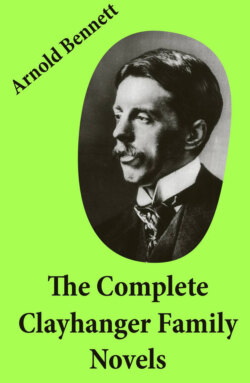Читать книгу The Complete Clayhanger Family Novels (Clayhanger + Hilda Lessways + These Twain + The Roll Call) - Arnold Bennett - Страница 182
На сайте Литреса книга снята с продажи.
Two.
ОглавлениеMrs Hamps was in the drawing-room. She had gone into the drawing-room because it was more secret, better suited to conversation of an exquisite privacy than the dining-room—a public resort at that hour. Edwin perceived at once that she was savouring intensely the strangeness of the occasion, inflating its import and its importance to the largest possible.
“Good morning, dear,” she greeted him in a low and significant tone. “I felt I must come up at once. I couldn’t fancy any breakfast till I’d been up, so I put on my bonnet and mantle and just came. It’s no use fighting against what you feel you must do.”
“But—”
“Hasn’t Maggie told you? Your father called to see me last night just after I’d gone upstairs. In fact I’d begun to get ready for bed. I heard the knocking and I came down and lit the gas in the lobby. ‘Who’s there?’ I said. There wasn’t any answer, but I made sure I heard some one crying. And when I opened the door, there was your father. ‘Oh!’ he said. ‘Happen you’ve gone to bed, Clara?’ ‘No,’ I said. ‘Come in, do!’ But he wouldn’t. And he looked so queer. I never saw him look like that before. He’s such a strong self-controlled man. I knew he’d been to poor Mr Shushions’s funeral. ‘I suppose you’ve been to the funeral, Darius,’ I said. And as soon as I said that he burst out crying, and half tumbled down the steps, and off he went! I couldn’t go after him, as I was. I didn’t know what to do. If anything happened to your father, I don’t know what I should do.”
“What time was that?” Edwin asked, wondering what on earth she meant—“if anything happened to your father!”
“Half-past ten or hardly. What time did he come home? Very, very late, wasn’t it?”
“A little after twelve,” he said carelessly. He was sorry that he had inquired as to the hour of the visit to his aunt. Obviously she was ready to build vast and terrible conjectures upon the mysterious interval between half-past ten and midnight.
“You’ve cut yourself, my dear,” she said, indicating with her gloved hand Edwin’s chin. “And I’m not surprised. How upsetting it is for you! Of course Maggie’s the eldest, and we think a great deal of her, but you’re the son—the only son!”
“I know,” he said, meaning that he knew he had cut himself, and he pressed his handkerchief to his chin. Within, he was blasphemously fuming. The sentimental accent with which she had finally murmured ‘the only son’ irritated him extremely, What in the name of God was she driving at? The fact was that, enjoying a domestic crisis with positive sensuality, she was trying to manufacture one! That was it! He knew her. There were times when he could share all Maggie’s hatred of Mrs Hamps, and this was one of those times. The infernal woman, with her shaking plumes and her odour of black kid, was enjoying herself! In the thousandth part of a second he invented horrible and grotesque punishments for her, as that all the clothes should suddenly fall off that prim, widowed, odious modesty. Yet, amid the multitude of his sensations—the smarting of his chin, the tingling of all his body after the bath, the fresh vivacity of the morning, the increased consciousness of his own ego, due to insufficient sleep, the queerness of being in the drawing-room at such an hour in conspiratorial talk, the vague disquiet caused at midnight, and now intensified despite his angry efforts to avoid the contagion of Mrs Hamps’s mood, and above all the thought of his father gloomily wandering in the garden—amid these confusing sensations, it was precisely an idea communicated to him by his annoying aunt, an obvious idea, an idea not worth uttering, that emerged clear and dramatic: he was the only son.
“There’s no need to worry,” he said as firmly as he could “The funeral got on his nerves, that’s all. He certainly did seem a bit knocked about last night, and I shouldn’t have been surprised if he’d stayed in bed today. But you see he’s up and about.” Both of them glanced at the window, which gave on the garden.
“Yes,” murmured Mrs Hamps, unconvinced. “But what about his crying? Maggie tells me he was—”
“Oh!” Edwin interrupted her almost roughly. “That’s nothing. I’ve known him cry before.”
“Have you?” She seemed taken aback.
“Yes. Years ago. That’s nothing fresh.”
“It’s true he’s very sensitive,” Mrs Hamps reflected. “That’s what we don’t realise, maybe, sometimes. Of course if you think he’s all right—”
She approached the window, and, leaning over the tripod which held a flower-pot enveloped in pink paper, she drew the white curtain aside, and gazed forth in silence. Darius was still pacing up and down the short path at the extremity of the garden; his eyes were still on the ground, and his features expressive of mournful despair, and at the end of the path he still turned his body round with slow and tedious hesitations. Edwin also could see him through the window. They both watched him; it was as if they were spying on him.
Maggie entered, and said, in an unusual flutter—
“Here’s Clara and Albert!”
